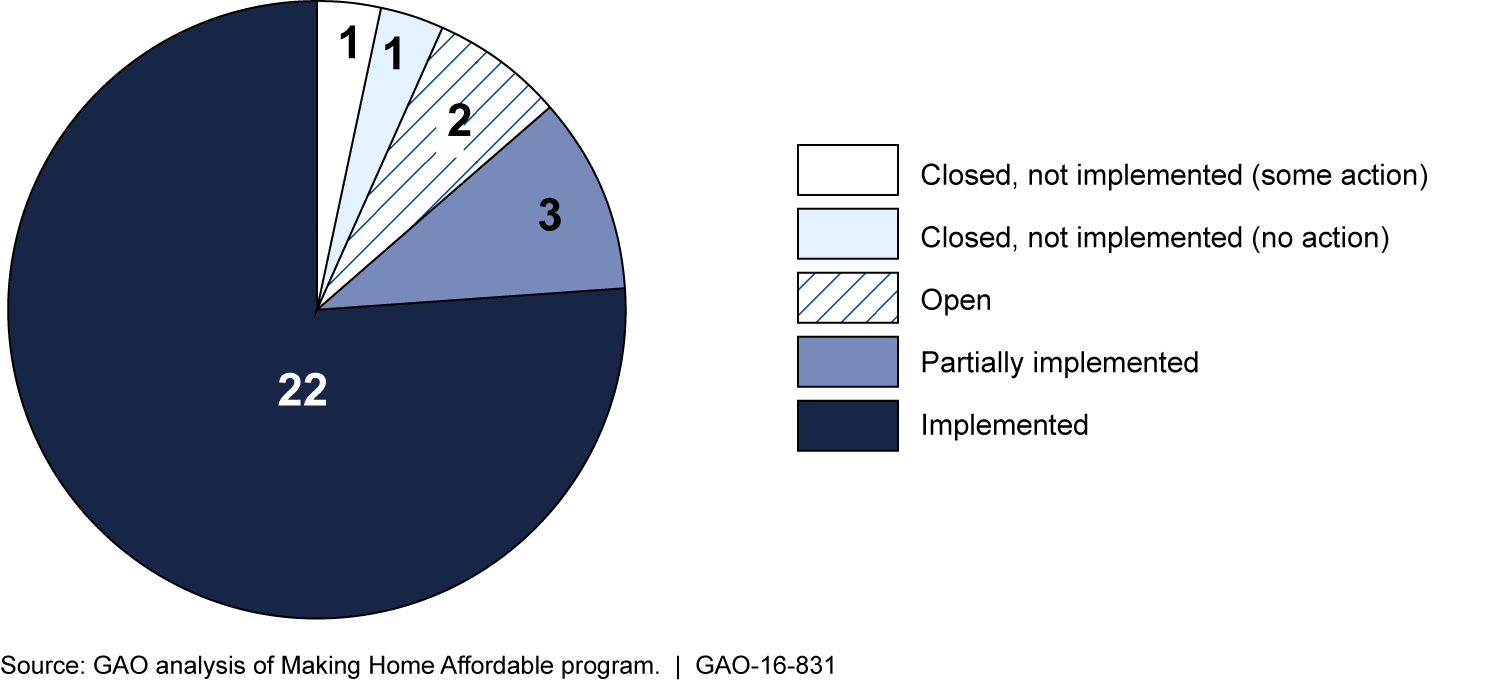Troubled Asset Relief Program: Status of Prior GAO Recommendations
Highlights
What GAO Found
As of August 2016, GAO's performance audits of the Troubled Asset Relief Program (TARP) activities have resulted in 74 recommendations to the Department of the Treasury (Treasury). Treasury has implemented 62 of the 74 recommendations, some of which were aimed at improving the transparency and internal controls of TARP. Five recommendations remain open, all pertaining to the Making Home Affordable (MHA) program, a collection of housing programs designed to help homeowners avoid foreclosure. Of the five:
- Treasury has partially implemented three open MHA recommendations—that is, it has taken some steps toward implementation but needs to take more actions. For example, in March 2016, GAO recommended that Treasury deobligate funds that its review showed would likely not be expended. Treasury's most recent estimates identified $4.7 billion in potential excess funds, of which Treasury has deobligated $2 billion as of August 2016.
- Two additional MHA recommendations remain open—that is, Treasury has not taken steps to implement them. GAO recommended that Treasury take steps to assess the extent to which servicers have established internal control programs that monitor compliance with fair lending laws applicable to MHA programs. GAO also recommended that Treasury establish a standard process to better ensure that changes to TARP-funded MHA programs are based on comprehensive cost-benefit analyses. Treasury told GAO they would consider this recommendation but has noted that it plans no major program policy changes given the December 30, 2016, application deadline for the MHA program.
Seven recommendations have been closed but were not implemented. Five were related to the Capital Purchase Program (CPP) and MHA and two to other TARP activities. Generally, these recommendations were closed because GAO determined that the recommendations were no longer applicable.
Making Home Affordable Recommendations as of August 22, 2016

Why GAO Did This Study
The Emergency Economic Stabilization Act of 2008 (EESA) authorized the creation of TARP to address the most severe crisis that the financial system had faced in decades. Treasury has been the primary agency responsible for TARP programs. EESA provided GAO with broad oversight authorities for actions taken under TARP and included a provision that GAO report at least every 60 days on TARP activities and performance.
This 60-day report describes the status of GAO's prior TARP performance audit recommendations to Treasury as of August 2016. In particular, this report discusses Treasury's implementation of GAO's recommendations focusing on two programs: CPP and MHA. GAO's methodologies included assessing relevant documentation from Treasury, interviewing Treasury officials, and reviewing prior TARP reports issued by GAO.
Recommendations
GAO continues to maintain that Treasury should take action to fully implement the three partially implemented and two open MHA recommendations. GAO will continue to assess the status of these recommendations considering new program activity and any further actions taken by Treasury.
